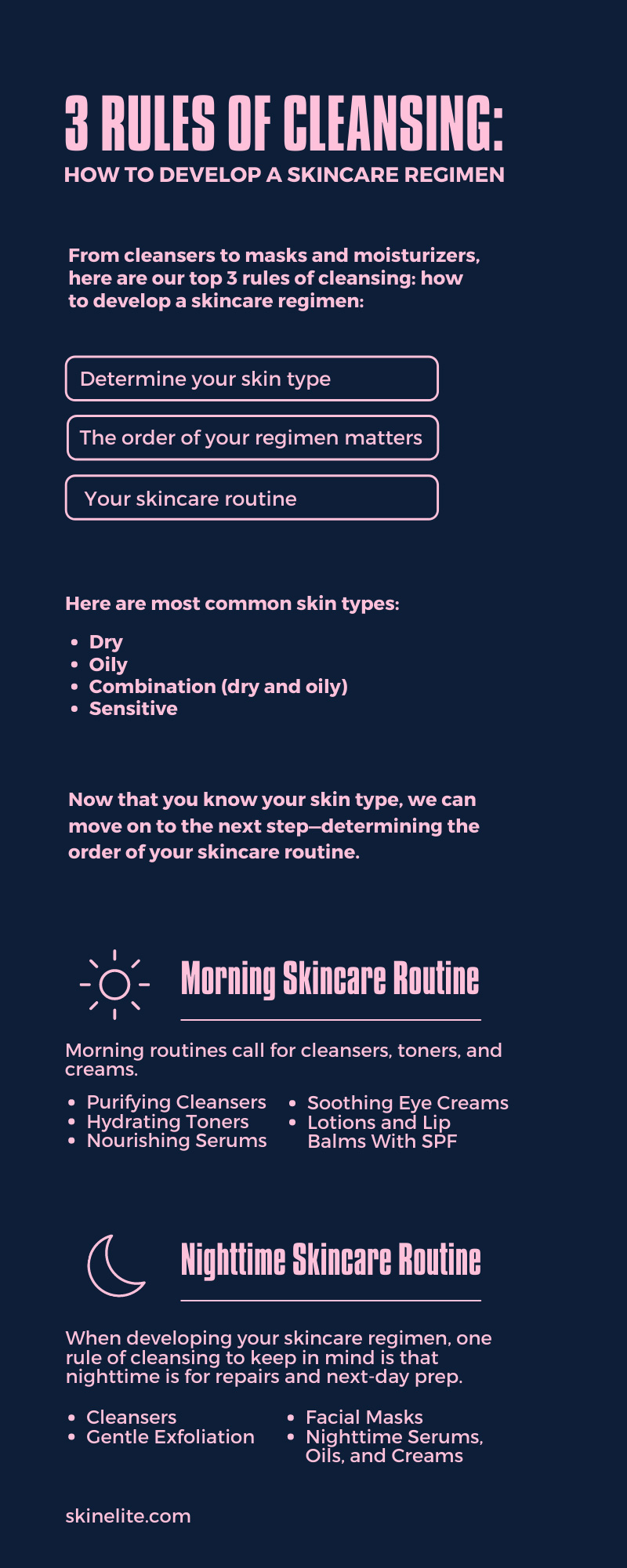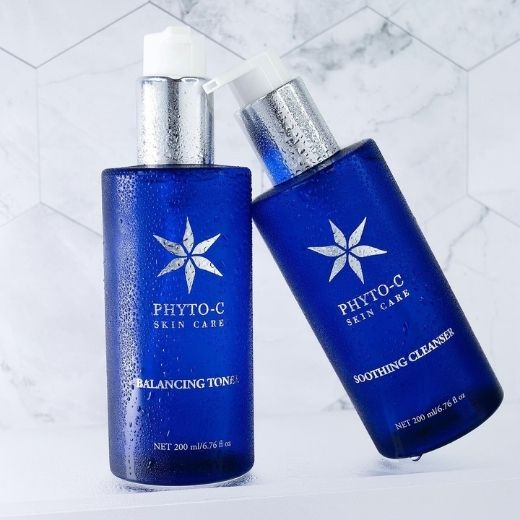3 Rules of Cleansing: How To Develop a Skincare Regimen
Sep 21st 2021
Your skin is the largest organ on your body. Because you’re constantly surrounded by it, and because of the important role your skin plays in protecting you, it’s important to nourish your skin and keep it as healthy as possible. One of the best ways to ensure the health and vitality of your skin is to follow a daily skincare routine. From cleansers to masks and moisturizers, here are our top 3 rules of cleansing: how to develop a skincare regimen.
Determine Your Skin Type
The first stop in our skincare journey is determining your skin type. Here are most common skin types:
- Dry
- Oily
- Combination (dry and oily)
- Sensitive
Knowing your skin type before piecing together your skincare routine is important for a number of reasons. You don’t want to waste your money on products that will only make your skin look and feel worse. Instead, you want to invest in products that will nourish and protect your skin. If you have particularly oily skin, using thick lotions and facial oils will contribute to breakouts and a continued glossy complexion.
The Order of Your Regimen Matters
Now that you know your skin type, we can move on to the next step—determining the order of your skincare routine. Regimens are usually divided into two categories: morning and night. You’ll use products in the morning that refresh your skin, protect against environmental stressors such as airborne toxins and UV rays, and fight dryness and discomfort. In the evening, you’ll use products that remove any unwanted particles, soothe your skin, and help repair any damages done during the day.
Morning Skincare Routine
Morning routines call for cleansers, toners, and creams.
Purifying Cleansers
Revitalizing and purifying, facial cleansers are the perfect way to start your daily skincare routine. They do a great job at removing any particles that may have settled on your skin overnight – even if you just washed your face the night before. If you tend to sweat in your sleep, it’s especially important to remove the oils and other impurities so they don’t clog up your pores.
One of the best things about cleansers are the number of options on the market. Individuals with a plant-based lifestyle may be particularly interested in phytoceuticals, such as Phyto C skin care products. These revolutionary cleansers, creams, and gels are all made specifically from plants.
Hydrating Toners
Toners – some people love them, and some people skip them. If you want to incorporate toners into your skincare routine, these products exfoliate, tighten pores, and provide a solid foundation for skincare products to follow. They also bring back a healthy level of moisture to your face after you cleanse it. Because of this, toners should be applied after cleansing your skin and before you apply a serum.
Nourishing Serums
Serums are incredibly diverse in the range of skin concerns they address. Because they feature smaller molecules than products such as moisturizers, they are able to permeate deeper into your skin. Their highly concentrated formulas are also more targeted than lotions.
Soothing Eye Creams
If you’re worried about fine lines and wrinkles or puffiness, eye cream is the perfect product to add to your skincare routine. Not to mention, eye creams can be delightfully soothing, especially if the formula features cooling ingredients!
Lotions and Lip Balms With SPF
It’s important to protect your skin throughout the day. Even in the winter, harmful UV rays break through the atmosphere and wreak havoc on your skin. Applying a moisturizer with sufficient SPF is a great way to keep your skin hydrated while also protecting it from the sun. It’s important to protect your lips, too—apply a SPF lip balm to protect and soothe your lips throughout the day.
Your Nighttime Skincare Routine
When developing your skincare regimen, one rule of cleansing to keep in mind is that nighttime is for repairs and next-day prep. Consider incorporating the following skincare methods into your nighttime routine.
Cleansers, Part Two
Yes, you washed your face in the morning. But it’s just as, if not more, important to wash your face before bed. So many impurities have built up on your skin throughout the day, and you don’t want to introduce them to your pillowcase. Besides, cleansing is always the first step of any skincare routine—even if the routine is just wash and hydrate.
Washing your face twice in a row with a gentle, soothing product will help you wash away any pollution, sweat, and makeup that gathered throughout the day. Why twice? The first wash cleanses away impurities, while the second actually washes the skin.
Gentle Exfoliation
Depending on the season and your skin type, exfoliating can be a very beneficial part of your skincare routine. If it’s summertime, it’s totally okay to exfoliate daily. If it’s fall or winter and you live in a climate with cold, dry air, you may want to consider exfoliating once or twice per week at max. While exfoliation does wonders with sloughing off dead skin cells, smoothing the texture of your skin, and brightening your skin’s appearance, it can prove to be too harsh for skin that’s overly dry.
Facial Masks
While you don’t need to apply a mask daily (unless you want to), masks are a great product to incorporate into your routine at least once or twice per month. Masks come in a wide range of formulas to treat specific concerns, nourish your skin, and restore hydration. They’re the perfect treat to look forward to after a long week of school or work.
Nighttime Serums, Oils, and Creams
Night serums, oils, and creams feature rich, nourishing formulas that your skin can absorb while you sleep. There are a variety of products to choose from depending on your skincare needs. However, it’s important to consider your skin type when choosing a serum, oil, or cream. If your skin is particularly oily, you’ll want a lightweight cream or serum. If your skin is dry, you’ll want a thicker cream.


